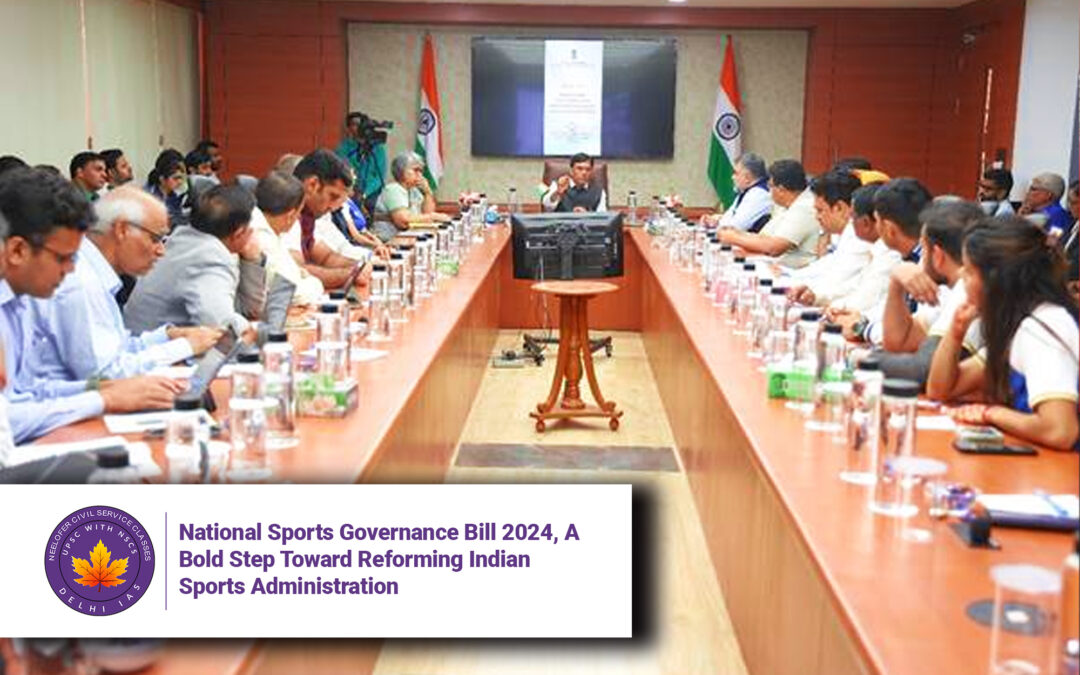National Sports Governance Bill 2024, A Bold Step Toward Reforming Indian Sports Administration
Why in News
On Wednesday, the National Sports Governance Bill was introduced in the Lok Sabha by Sports Minister Mansukh Mandaviya. The Bill proposes two major changes: the creation of a powerful National Sports Board and a National Sports Tribunal, fundamentally altering how sports federations operate and disputes are resolved in India. 
Introduction
India’s sports governance has long been plagued by lack of transparency, political interference, poor regulation, and court entanglements. With this new Bill, the government attempts to address these systemic issues by establishing two powerful statutory institutions:
-
The National Sports Board – to regulate and supervise sports federations with sweeping powers, even over autonomous bodies like the BCCI.
-
The National Sports Tribunal – to resolve disputes in selections, federation elections, and athlete grievances, with appeals lying only to the Supreme Court.
These institutions mirror regulatory frameworks like SEBI in the financial world, bringing structure to an otherwise fragmented ecosystem. Eminent sports lawyer Nandan Kamath explains that this Bill is a long-overdue reform grounded in the 2007 National Sports Policy.
Key Issues and Background
-
The need for a sports regulator has existed since the Draft Comprehensive National Sports Policy 2007.
-
Many provisions of the Bill align with previously drafted but unpassed legislation like the National Sports Development Bill.
-
Numerous federations today operate via ad hoc committees, with internal elections frequently challenged in courts.
-
The 2011 Sports Code lacked legal enforceability, leading to widespread non-compliance and lack of consistency in governance.
Specific Impacts or Effects
1. National Sports Board
-
A SEBI-like body with statutory powers.
-
Can lay down rules, monitor federations, and oversee governance.
-
Will register all affiliated units of the NSFs.
-
Powers were previously within the Sports Ministry, but now transferred to a statutory board — increasing transparency and public scrutiny.
-
Will reduce confusion among players and stakeholders about which body governs which sport.
2. National Sports Tribunal
-
Independent dispute resolution body.
-
Deals with issues from athlete selection to internal federation conflicts.
-
Tribunal decisions can only be challenged in the Supreme Court.
-
Will reduce delays and backlog in sports-related litigation.
-
Helps avoid excessive judicial intervention in sports bodies.
Challenges and the Way Forward
Independence & Conflict of Interest
-
It is crucial the Tribunal remains independent and free of political influence.
-
India’s past tribunals have struggled due to lack of credibility.
-
Members must be well-qualified and independent-minded.
Implementation Risks
-
There is a risk of over-centralisation.
-
History shows poor execution of well-intended sports reforms.
-
Need for regular audits and evaluation of how the Board and Tribunal function.
Age Limits & Leadership
-
The Bill proposes an upper age limit of 75 for administrators.
-
This aims to promote younger, more active leadership, but may face resistance from existing power centers.
The BCCI Issue
-
Historically, the BCCI has resisted government regulation.
-
Though the Bill includes it under the Sports Board’s purview, actual implementation may face legal and political hurdles.
-
Legal clarity on how the Board will exercise authority over BCCI remains to be tested.
Conclusion
The National Sports Governance Bill is a watershed moment in India’s attempt to clean up its sports administration. By moving away from arbitrary decision-making, fostering transparency, and ensuring independent conflict resolution, the Bill aspires to build robust sports institutions.
However, as sports lawyer Nandan Kamath warns, this reform will only be as strong as its implementation. Success will depend on the integrity, independence, and capability of the people entrusted with these new institutions. If done right, this could be the reset Indian sports governance has long awaited.
5 Important Questions and Answers
1. What is the purpose of the National Sports Governance Bill?
To create a statutory National Sports Board and Tribunal that can regulate federations and resolve disputes.
2. Will this affect powerful bodies like BCCI?
Yes. The Bill brings all federations, including the BCCI, under the Board’s oversight.
3. Why is a Tribunal needed?
To offer quicker, independent resolution of sports-related disputes, avoiding delays in regular courts.
4. What is the significance of setting an age limit of 75?
It encourages newer, younger leadership in sports bodies, aiming for better governance.
5. Is this the first such initiative?
No, but it’s the first time sports governance may be handled by a SEBI-style statutory body with clearly defined roles and powers.








